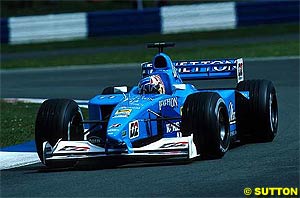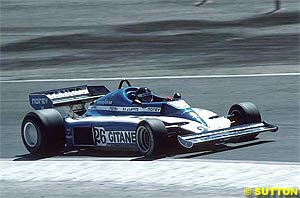
Atlas F1 Magazine Writer
Find out when was the last time that Jordan had both cars in the points, or why there is (some) hope that Michael Schumacher will not win the US Grand Prix. Marcel Schot brings the answers and more anecdotes on the United States Grand Prix
The disqualification of both Williams and Toyota cars put two teams in the points with both cars. For McLaren it was the first time since Japan last year, while for Jordan it didn't happen since San Marino 2001. Timo Glock scored two points in his debut race, making him the 14th youngest driver in Formula One history to score points.
For Michael Schumacher winning is normal. However, of his 77 wins only four have come from sixth or worse on the grid. The first time he did this was in Estoril in 1993, where he started from sixth to record his second victory. After that, it was the 1995 Belgian Grand Prix, where the German showed his mastership in wet conditions when winning from 16th after a spoiled qualifying session. The last time he won from outside the top five was last season, when he scored a win from seventh at Indianapolis.
For the 2004 edition of the US Grand Prix looking at things strictly statistical might give a bit of hope for those who aren't happy with all those Schumacher wins. The German won the race last season, but since the US Grand Prix moved to Indianapolis four years ago, no driver has been able to win the event in consecutive years. However, with two wins and two second places, the World Champion is the only driver to have scored podium finishes in all of the four races at Indianapolis.
Two of a Kind
In the short history of the US Grand Prix at Indianapolis, two drivers have driven their 50th race there. In 2000 it was Alexander Wurz for Benetton and in 2002 Jenson Button in the Renault.
Wurz had had a bad season before the Formula One circus travelled to Indianapolis for the first time. With just a single exception the Austrian qualified on the lower half of the grid and the race results didn't give much reason for cheering either. Wurz' only points came through a fifth place finish in Monza, the race before the American Grand Prix.
Qualifying in Indianapolis didn't see any surprises for Wurz. After a relatively good session the Austrian was in eleventh place, just like in Monza. However, while the trend in the race was upward in Italy, it went downward very fast in Indianapolis. After a rainy morning, the track was still drying in the early stages of the race. This badly affected the handling of Wurz' Benetton, losing one a place at the start and another when Pedro de la Rosa passed him a few laps into the race.
Jenson Button's 50th race two years later didn't give much more reason for celebration. The young Briton had been a regular point scorer throughout the season, narrowly missing out on podium finishes on several accounts. However, from first practice it was clear that the Renault wasn't doing well at Indianapolis. Difficulties in finding the right set-up resulted in a 14th position on the grid, over one and a half seconds behind pole.
A good start moved Button up into twelfth place, but already in lap two Jordan driver Takuma Sato moved past the Briton. However, Ralf Schumacher's pitstop made sure the Renault driver remained in twelfth place. A kamikaze action of Sato to pass Heinz-Harald Frentzen five laps later saw the Japanese driver go off into the grass and nearly colliding with the German. In the confusion, Button passed both cars to move into the top ten. The two weren't able to regain ground and Button stayed in place until his pitstop.
Unfortunately, the Briton returned to the track in heavy traffic, losing much time and ending up 13th after the first round of pitstops was completed. Being on a one stopper meant that the Renault driver moved up as others made their second stop, but ultimately it also meant that he was unable to really attack. With only few retirements, Button's march up the field ended in eight place, well behind the scandalous finish in which Michael Schumacher blatantly handed Rubens Barrichello the win.
This Week in History
This week it's 27 years ago that Ligier won its first of nine races. The 1977 season had started out a bit worse than the team's debut season the year before. With the exception of Long Beach and Jarama the single car of Jacques Laffite qualified on the lower half of the grid. The races weren't much better either, with five retirements and two seventh places in the first seven races.
With this in mind, first qualifying in Sweden was very hopeful. Laffite managed to put the car fourth on the provisional grid. Ahead of the Frenchman were Mario Andretti in the Lotus, McLaren driver James Hunt and Jody Scheckter in the Wolf. However, the second Lotus of Gunnar Nilsson and both Brabham drivers Hans Joachim Stuck and John Watson were less than a tenth of a second behind the Ligier.
In the second qualifying session Laffite managed a sixth place behind Watson, Scheckter, Andretti, Hunt and Patrick Depailler in the Tyrrell. Unfortunately for the Frenchman, things didn't go as planned in the third and final session. The session saw the Ligier driver down in an all too familiar 16th place and losing two more places on the grid as Hans Joachim Stuck and Gunnar Nilsson went faster than his second session time.
After 22 laps Laffite finally found a way past Reutemann, moving into seventh place. In front Mario Andretti was running away with things, followed by Watson and Scheckter. Hunt, Depailler and Jochen Mass completed the point-scoring positions. This remained unchanged until Jody Scheckter launched an overtaking manoeuvre on John Watson that saw the two collide. The South African retired on the spot, while Watson limped to the pits, moving everyone two places up. Meanwhile Laffite's pace was very good and he was gaining on Mass and Depailler. On lap 38, the Ligier driver passed Mass and a lap later Depailler. Another two laps later Laffite made his way past World Champion James Hunt, whose McLaren was suffering from excessive tyre wear.
Now Laffite began his hunt for Andretti, who was 15 seconds ahead. In the end, just as it appeared that second place, excellent as it was, was the maximum score for Laffite, Andretti drove into the pits with a fuel metering problem. With two laps to go this gave Laffite and Ligier their first victory as Jochen Mass was ten seconds behind them.
Ralf Schumacher scored his fifth career pole in Canada. With two poles in Canada, two in France and one in Monaco, it's striking to see the German only take top honours in French speaking areas. Until this weekend's disqualification, the Williams driver also shows remarkable efficiency from pole with a win, two second places and a fourth place.
 After seven laps the Benetton driver pitted to change from wets to dry weather tyres, dropping to 19th place. This sealed Wurz' fate for the race. His position improved as several cars in front of him retired or ran into problems, but both Wurz and his teammate Giancarlo Fisichella remained at the back of the field. Wurz pushed as hard as he could, posting the seventh fastest laptime towards the end of the race, but to no avail. When the chequered flag was waved, the Austrian was in a faceless tenth position, a lap down from race winner Michael Schumacher.
After seven laps the Benetton driver pitted to change from wets to dry weather tyres, dropping to 19th place. This sealed Wurz' fate for the race. His position improved as several cars in front of him retired or ran into problems, but both Wurz and his teammate Giancarlo Fisichella remained at the back of the field. Wurz pushed as hard as he could, posting the seventh fastest laptime towards the end of the race, but to no avail. When the chequered flag was waved, the Austrian was in a faceless tenth position, a lap down from race winner Michael Schumacher.
 The warm-up on Sunday morning already showed something of things to come, as Laffite was fastest, no less than eight tenths of a second ahead of number two John Watson. However, when the race started things didn't look so good anymore for the Ligier driver. He dropped from eight to eleventh before the first lap was done, ending up in a Ferrari sandwich of Carlos Reutemann and Niki Lauda, who had both made good starts from their dismal grid positions of 12th and 15th respectively. Early in the race both local heroes Gunnar Nilsson and Ronnie Peterson ran into problems and dropped out of the top ten, moving Laffite up to ninth without too much effort. It wasn't long until it appeared that Hans-Joachim Stuck wasn't able to maintain his qualifying pace and both Reutemann and Laffite were able to pass the German without any problems.
The warm-up on Sunday morning already showed something of things to come, as Laffite was fastest, no less than eight tenths of a second ahead of number two John Watson. However, when the race started things didn't look so good anymore for the Ligier driver. He dropped from eight to eleventh before the first lap was done, ending up in a Ferrari sandwich of Carlos Reutemann and Niki Lauda, who had both made good starts from their dismal grid positions of 12th and 15th respectively. Early in the race both local heroes Gunnar Nilsson and Ronnie Peterson ran into problems and dropped out of the top ten, moving Laffite up to ninth without too much effort. It wasn't long until it appeared that Hans-Joachim Stuck wasn't able to maintain his qualifying pace and both Reutemann and Laffite were able to pass the German without any problems.
|
Contact the Author Contact the Editor |
Please Contact Us for permission to republish this or any other material from Atlas F1.
|
Volume 10, Issue 24
Atlas F1 Exclusive
A Weekend with Timo Glock
Bjorn Wirdheim: Going Places
Ann Bradshaw: Point of View
2004 Canadian GP Review
2004 Canadian GP Review
Just Enough
2004 US GP Preview
2004 US Grand Prix Preview
US GP Facts & Stats
Stats Center
Qualifying Differentials
SuperStats
Charts Center
Columns
Season Strokes
Rear View Mirror
Elsewhere in Racing
The Weekly Grapevine
> Homepage |